एक शर्मीली, बहिष्कृत लड़की अपनी टेलीकेनेटिक शक्तियों से अपने छोटे शहर में आतंक ढाती है, जब उसके सीनियर प्रॉम में उसके साथ एक भद्दा मज़ाक होता है.एक शर्मीली, बहिष्कृत लड़की अपनी टेलीकेनेटिक शक्तियों से अपने छोटे शहर में आतंक ढाती है, जब उसके सीनियर प्रॉम में उसके साथ एक भद्दा मज़ाक होता है.एक शर्मीली, बहिष्कृत लड़की अपनी टेलीकेनेटिक शक्तियों से अपने छोटे शहर में आतंक ढाती है, जब उसके सीनियर प्रॉम में उसके साथ एक भद्दा मज़ाक होता है.
- निर्देशक
- लेखक
- स्टार
- पुरस्कार
- 6 जीत और कुल 7 नामांकन
Eddie Max Huband
- Harry Trenant
- (as Eddie Huband)
फ़ीचर्ड समीक्षाएं
I have been eagerly awaiting this movie since I heard of the casting of Chloe Grace Moretz. I could totally picture her portraying the character in the style and feel created by Sissy Spacek and followed up by Angela Bettis (2002 TV movie). I knew she would be a worthy successor after seeing the film Let Me In. I was, however, skeptical of the casting of Julianne Moore as the religious fanatic mother of Carrie, Margaret White.
After seeing the film twice this weekend, Julianne Moore turned out a creepy performance that should definitely garner her an Academy Award nod. Her portrayal of Margaret White was an emotional witches brew of fanaticism, insanity, and maternal instinct. For me, it was an unexpected treat.
As for Carrie, Chloe Grace Moretz did a fine job. She had big shoes to fill, and her performance does not top that of Sissy Spacek. However, she does hold her own. In all three versions of Carrie, each actress has portrayed Carrie in a different way. Each excelling in making the role their own while maintaining the artistic concept of Carrie herself. Chloe did deliver a chilling performance during the scenes where Carrie is exacting her revenge.
As for the movie itself, I would describe it as a remake of the 1976 film sprinkled with some additional elements from the Stephen King novel. It was very well made, and the modernization is appropriate without being too obvious of the change in times, i.e cell phones, the Internet, etc.
In closing, Carrie is an extremely competent attempt at remaking a classic. As I say with all remakes, you have to go into it with an open mind and not with the mind set of comparing it to the original. If you do that, you will find Carrie is a good movie.
After seeing the film twice this weekend, Julianne Moore turned out a creepy performance that should definitely garner her an Academy Award nod. Her portrayal of Margaret White was an emotional witches brew of fanaticism, insanity, and maternal instinct. For me, it was an unexpected treat.
As for Carrie, Chloe Grace Moretz did a fine job. She had big shoes to fill, and her performance does not top that of Sissy Spacek. However, she does hold her own. In all three versions of Carrie, each actress has portrayed Carrie in a different way. Each excelling in making the role their own while maintaining the artistic concept of Carrie herself. Chloe did deliver a chilling performance during the scenes where Carrie is exacting her revenge.
As for the movie itself, I would describe it as a remake of the 1976 film sprinkled with some additional elements from the Stephen King novel. It was very well made, and the modernization is appropriate without being too obvious of the change in times, i.e cell phones, the Internet, etc.
In closing, Carrie is an extremely competent attempt at remaking a classic. As I say with all remakes, you have to go into it with an open mind and not with the mind set of comparing it to the original. If you do that, you will find Carrie is a good movie.
Some might remember this for it's viral marketing (putting a woman with powers into a café as a teaser to this was almost geniuses) or for the fact that it tried to recreate a classic horror movie. Whatever your point is or was coming into this, you will see a very solid horror movie that updated a classic and took it into the current time. There are themes explored here, that weren't touched upon in the original, which is a smooth move.
Other than that Moretz delivers one strong lead performance. If you know the original or have read the description you will know where this is heading. It won't spoil too much or take too much away from it though, because it is well directed. It might be too neat in places, but overall this does have punches and it's not afraid to deliver them. Overall not as good as the classic, but way better than one could expect it to be
Other than that Moretz delivers one strong lead performance. If you know the original or have read the description you will know where this is heading. It won't spoil too much or take too much away from it though, because it is well directed. It might be too neat in places, but overall this does have punches and it's not afraid to deliver them. Overall not as good as the classic, but way better than one could expect it to be
It seems something of an obligation to dismiss remakes out of hand these days. Many of us do so with such confidence that we'll condemn the film in advance of its screening. Kimberly Pierce's remake of Carrie isn't an insult to De Palma's original; it is, in fact, an adequately performed, well-filmed picture, but one cannot help escape the inevitable baggage that comes with this film. It doesn't hold a candle to De Palma's original, which wasn't - if we're being honest - really scary, but elevated by the director's flair, enthusiasm, and stylistic excess. Visually, this film is inoffensive, but that's it's problem: it's flat and uninspired.
Chloe Grace Moretz is fine as the lead, but the script lets her down. In the original, Carrie (Sissy Spacek) reacts to her powers with bewilderment; hers is not one of awe and wonder, but a kind of fearful curiosity. Here, Carrie takes to her telekinetic powers with verve, gleefully levitating objects around her bedroom in moments that would be right at home in Matilda. The character of Sue Snell, who opts to redeem herself, is thinly written, as is her boyfriend, Tommy Ross. Chris Hargensen, who was played to perfection by Nancy Allen in the original, is more fleshed out than one would expect, but her interactions with her conspirators and Sue Snell seem, for want of a better expression, off. Astonishingly, it is Julianne Moore, a truly exceptional actress, who is miscast here. Piper Laurie was central to the original's success, playing on the absurdities of her character's dogmatic lunacy. Moore plays it straight, which, to her credit, is a departure from Laurie's performance, but it is wholly unconvincing.
The third act is a technical and dramatic misfire; it's all pyrotechnics. The pig's blood that ignites Carrie's - if you will - baptism by fire is of major significance. It's that moment when the film's fascinating relationship with the absurd and the horrific boil over. De Palma knew this and executed with gusto; Pierce does not.
Chloe Grace Moretz is fine as the lead, but the script lets her down. In the original, Carrie (Sissy Spacek) reacts to her powers with bewilderment; hers is not one of awe and wonder, but a kind of fearful curiosity. Here, Carrie takes to her telekinetic powers with verve, gleefully levitating objects around her bedroom in moments that would be right at home in Matilda. The character of Sue Snell, who opts to redeem herself, is thinly written, as is her boyfriend, Tommy Ross. Chris Hargensen, who was played to perfection by Nancy Allen in the original, is more fleshed out than one would expect, but her interactions with her conspirators and Sue Snell seem, for want of a better expression, off. Astonishingly, it is Julianne Moore, a truly exceptional actress, who is miscast here. Piper Laurie was central to the original's success, playing on the absurdities of her character's dogmatic lunacy. Moore plays it straight, which, to her credit, is a departure from Laurie's performance, but it is wholly unconvincing.
The third act is a technical and dramatic misfire; it's all pyrotechnics. The pig's blood that ignites Carrie's - if you will - baptism by fire is of major significance. It's that moment when the film's fascinating relationship with the absurd and the horrific boil over. De Palma knew this and executed with gusto; Pierce does not.
How well you respond to the new remake of "Carrie" may depend greatly on how your mind is associated with the material that inspired it. If this is your introduction to this enterprise, it may be kind to suggest that you check out Brian DePalma's original 1976 horror classic, or Stephen King's 1974 debut novel. That's where you get the true meat of the story. Kimberly Peirce's remake is glossy, pretty and professionally made, but it adds almost nothing new. It is violent and energetic, but it lacks the sustained melancholy creepiness that made the original so memorable. Peirce has the parts of the story in the right order but her film lacks a sense of tone and mood. She can play the notes, but not the music.
DePalma's film remains a permanent fixture of our popular culture because he understood that the foundation of Stephen King's best work comes from his ability to pry supernatural events out of a foundation of realism – i.e. the more realistic his environment, the scarier the magical stuff plays out. Plus, it had the added bonus of a previously unknown actress named Sissy Spacek in a brilliant performance that made her a star. Knowing that, it may be possible that no filmmaker could have revised this material. By this point there may not be anything new to explore. After the book, the 1976 movie, a 1999 sequel and a 2002 TV movie, we know this story so well that the narrative of a remake is more or less perfunctory. It becomes less a story and more of a checklist keywords: prom, dirty pillows, pig blood, tampons, prayer closet, telekinesis. The pieces are here, but there are very few surprises.
The story is one of alienation. We know that the world is populated with more young people like Carrie then than the prom queens who torment her, and with all the news stories lately about the horrors of bullying, this new film might have been a good chance to shed some light on the subject. Yet, there seems to have been no ambition to expand on the original idea. Pierce, who is openly gay, understands alienation first hand. She previously made "Boys Don't Cry," the story of Brandon Teena, a girl suffering a sexual identity crisis (for that film Hilary Swank got an Oscar for Best Actress). She also made "Stop-Loss" about a soldier who returns home from Iraq, but refuses to go back. Here, in her first big commercial film, she seems to have lost her creative edge. The movie is long on plot but very short on personality.
One of the biggest problems lies in the casting of Chloë Grace Moretz in the title role. She's so conventionally pretty that we have trouble believing that she could ever be a wallflower. This is a story about a girl who is so spaced away from the world that she might as well be invisible. She's trapped in a body that offers a telekinetic ability that she can neither control nor adequately explain. Moretz is not a bad actress, but she has such a strong screen presence that we don't feel her defenselessness.
The people around Carrie aren't people, so much as standard movie requirements. There's the snobbish queen bee (Portia Doubleday) who torments Carrie at school. There's her lunkhead boyfriend (Alex Russell) who acquires the pig blood. There's the nice guy (Ansel Elgort) who agrees to take Carrie to prom. There's the P.E. coach (Judy Greer) who defends Carrie against her tormentors. There's the principal (Barry Shabaka Henley) who is so petrified of a lawsuit that he can hardly speak. These characters aren't given personalities; they are just functions of the plot.
The one performance in the film that does work is Julianne Moore as Carrie's hyper-religious mother, Margaret. Moore does a nice job of playing a woman so encased in her own God-fearing paranoia that she shuts out a world that she feels pleasures itself at the altar of a fallen creation – which includes pretty much everyone. The worst of this vantage point she pushes on Carrie herself, locking her in a closet and declaring that her special power makes her a tool of the devil. The set designer has done a good job of creating Margaret and Carrie's home as a sponge-cleaned den of claustrophobia and blandness.
The scenes between Carrie and her mother are the best parts of this story because they reveal two broken personalities that eventually face off in a final conflict that seems to have been preordained from the moment that Carrie came into the world. The rest of the movie is pretty much a tired march through a story that's been told three times before. There are some nice touches. The prom scene is well made. Peirce allows Moretz to wave her arms during the final telekinetic fury as if she were conducting a symphony of terror and mayhem. Yet, it's a moment of originality so clever that you wish the rest of the movie had followed.
Is "Carrie" entertaining? Not really. If you know this story already, there's no real reason to see this one. It only goes to further the mystery of why remakes are even necessary. Why remake this movie beyond the attempt to cash in on a brand name? Why not remake movies that were bad? Make them better. 37 years after the Brian DePalma's masterwork, horror fans are still talking about it. This film is so forgettable that 37 years after this remake, horror fans may have to be reminded that it was ever made in the first place.
** (of four)
DePalma's film remains a permanent fixture of our popular culture because he understood that the foundation of Stephen King's best work comes from his ability to pry supernatural events out of a foundation of realism – i.e. the more realistic his environment, the scarier the magical stuff plays out. Plus, it had the added bonus of a previously unknown actress named Sissy Spacek in a brilliant performance that made her a star. Knowing that, it may be possible that no filmmaker could have revised this material. By this point there may not be anything new to explore. After the book, the 1976 movie, a 1999 sequel and a 2002 TV movie, we know this story so well that the narrative of a remake is more or less perfunctory. It becomes less a story and more of a checklist keywords: prom, dirty pillows, pig blood, tampons, prayer closet, telekinesis. The pieces are here, but there are very few surprises.
The story is one of alienation. We know that the world is populated with more young people like Carrie then than the prom queens who torment her, and with all the news stories lately about the horrors of bullying, this new film might have been a good chance to shed some light on the subject. Yet, there seems to have been no ambition to expand on the original idea. Pierce, who is openly gay, understands alienation first hand. She previously made "Boys Don't Cry," the story of Brandon Teena, a girl suffering a sexual identity crisis (for that film Hilary Swank got an Oscar for Best Actress). She also made "Stop-Loss" about a soldier who returns home from Iraq, but refuses to go back. Here, in her first big commercial film, she seems to have lost her creative edge. The movie is long on plot but very short on personality.
One of the biggest problems lies in the casting of Chloë Grace Moretz in the title role. She's so conventionally pretty that we have trouble believing that she could ever be a wallflower. This is a story about a girl who is so spaced away from the world that she might as well be invisible. She's trapped in a body that offers a telekinetic ability that she can neither control nor adequately explain. Moretz is not a bad actress, but she has such a strong screen presence that we don't feel her defenselessness.
The people around Carrie aren't people, so much as standard movie requirements. There's the snobbish queen bee (Portia Doubleday) who torments Carrie at school. There's her lunkhead boyfriend (Alex Russell) who acquires the pig blood. There's the nice guy (Ansel Elgort) who agrees to take Carrie to prom. There's the P.E. coach (Judy Greer) who defends Carrie against her tormentors. There's the principal (Barry Shabaka Henley) who is so petrified of a lawsuit that he can hardly speak. These characters aren't given personalities; they are just functions of the plot.
The one performance in the film that does work is Julianne Moore as Carrie's hyper-religious mother, Margaret. Moore does a nice job of playing a woman so encased in her own God-fearing paranoia that she shuts out a world that she feels pleasures itself at the altar of a fallen creation – which includes pretty much everyone. The worst of this vantage point she pushes on Carrie herself, locking her in a closet and declaring that her special power makes her a tool of the devil. The set designer has done a good job of creating Margaret and Carrie's home as a sponge-cleaned den of claustrophobia and blandness.
The scenes between Carrie and her mother are the best parts of this story because they reveal two broken personalities that eventually face off in a final conflict that seems to have been preordained from the moment that Carrie came into the world. The rest of the movie is pretty much a tired march through a story that's been told three times before. There are some nice touches. The prom scene is well made. Peirce allows Moretz to wave her arms during the final telekinetic fury as if she were conducting a symphony of terror and mayhem. Yet, it's a moment of originality so clever that you wish the rest of the movie had followed.
Is "Carrie" entertaining? Not really. If you know this story already, there's no real reason to see this one. It only goes to further the mystery of why remakes are even necessary. Why remake this movie beyond the attempt to cash in on a brand name? Why not remake movies that were bad? Make them better. 37 years after the Brian DePalma's masterwork, horror fans are still talking about it. This film is so forgettable that 37 years after this remake, horror fans may have to be reminded that it was ever made in the first place.
** (of four)
This movie is hardly a scene-by-scene account of Brian De Palma brilliantly 'Carrie'. Yes, it impossible not to compare any remake to its original version, especially when the original is considered a classic. It is sad that with these days' shortage of originality, even a seemingly talented director such as Kimberly Peirce, succumbs to the commercial appeal of movie-making in the sole interest of monetary gain resulting in watered-down quality. Well, I'm not even sure if this movie will make its money back, given the mediocrity in all aspects of its quality. But then again, there are a lot of junks out there that make tons of money. All the efforts for the reimagining, whether it be an attempt to create a franchise or sequel or to modernize the narrative has totally undermined the essence of this otherwise compelling story. The destructiveness of social isolation, religious fanaticism, BULLYING, to name a few, underlined in Stephen King's novel were in no way conveyed effectively in this movie. There is a lack of connection in Moretz's performance and she is unconvincing as a socially deprived and awkward girl. Julianna Moore as always delivers a competent performance. But she can only carry the movie so far. As talented as Moretz is, she is a miscast for this movie. As such, the movie is moderately entertaining at best.
Stephen King Movies Ranked by IMDb Rating
Stephen King Movies Ranked by IMDb Rating
See how IMDb users rank the feature films based on the work of Stephen King.
क्या आपको पता है
- ट्रिवियाBecause Chloë Grace Moretz was a minor, she was limited to eight hours of work per day. When she was unavailable, director Kimberly Peirce substituted; she would be off-screen. This was only done with scenes that Julianne Moore would talk to Carrie.
- गूफ़When Tommy collapses on the stage, he is facing Carrie, but when Carrie tries to cradle Tommy, he is facing the backdrop.
- भाव
Sue Snell: No! Carrie please don't hurt me.
Carrie White: Why not? I've been hurt my whole life.
- इसके अलावा अन्य वर्जनThe theatrical version ends with a brief scene of Sue in court for the White Investigation (an integral part of the Stephen King novel otherwise omitted from the film) and then laying a flower on Carrie White's grave, which cracks as she walks away. The alternate Blu-ray cut omits the courtroom scene and features a different edit of Sue placing the flower on Carrie's grave. This scene is followed with Sue in the delivery room giving birth, but instead of a baby, Carrie's arm emerges from between her legs and grabs her. There is then a quick cut to Sue's mother, who is holding and trying to awaken her hysterical, pregnant daughter from this nightmare.
- साउंडट्रैकEnd of the Earth
Written by Ben Schneider
Performed by Lord Huron
Courtesy of IAMSOUND Records
By arrangement with Sony Music Licensing
टॉप पसंद
रेटिंग देने के लिए साइन-इन करें और वैयक्तिकृत सुझावों के लिए वॉचलिस्ट करें
- How long is Carrie?Alexa द्वारा संचालित
- What is "Carrie" about?
- Is "Carrie" based on a book?
- How does the movie end?
विवरण
- रिलीज़ की तारीख़
- कंट्री ऑफ़ ओरिजिन
- आधिकारिक साइटें
- भाषा
- इस रूप में भी जाना जाता है
- Cơn Thịnh Nộ Của Carrie
- फ़िल्माने की जगहें
- मिसिसॉगा, ओंटारियो, कनाडा(Carrie's House)
- उत्पादन कंपनियां
- IMDbPro पर और कंपनी क्रेडिट देखें
बॉक्स ऑफ़िस
- बजट
- $3,00,00,000(अनुमानित)
- US और कनाडा में सकल
- $3,52,66,619
- US और कनाडा में पहले सप्ताह में कुल कमाई
- $1,61,01,552
- 20 अक्टू॰ 2013
- दुनिया भर में सकल
- $8,47,90,678
- चलने की अवधि1 घंटा 40 मिनट
- रंग
- ध्वनि मिश्रण
- पक्ष अनुपात
- 2.35 : 1
इस पेज में योगदान दें
किसी बदलाव का सुझाव दें या अनुपलब्ध कॉन्टेंट जोड़ें









































